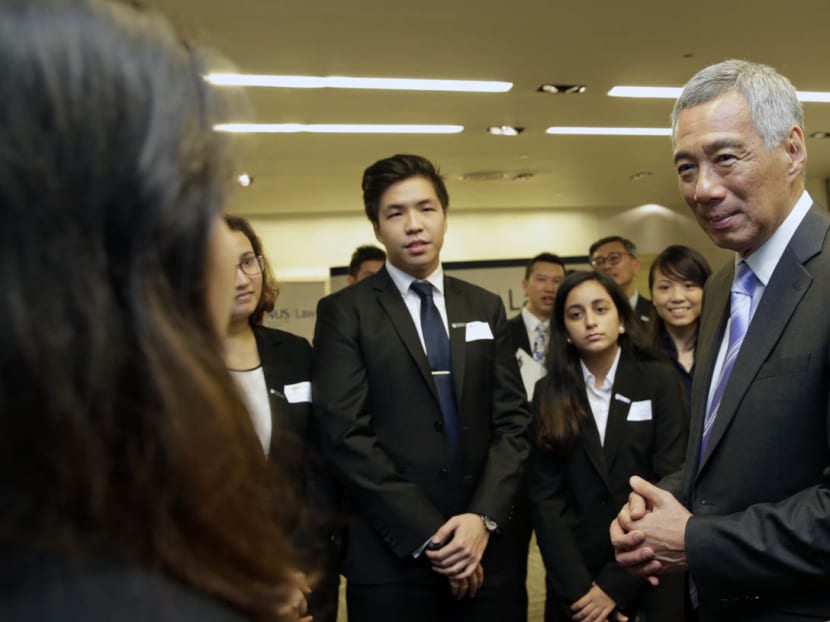S’pore must keep its laws up-to-date to stay competitive: PM Lee
SINGAPORE — Noting that “up-to-date, effective but not onerous” regulation has become a new source of economic competitiveness, Prime Minister Lee Hsien Loong on Monday (May 29) stressed the need to keep Singapore’s laws and its legal fraternity abreast of developments.

PM Lee Hsien Loong speaks to law students during the official launch of the EW Barker Centre for Law & Business, May 29, 2017. Photo: Wee Teck Hian/TODAY
SINGAPORE — Noting that “up-to-date, effective but not onerous” regulation has become a new source of economic competitiveness, Prime Minister Lee Hsien Loong on Monday (May 29) stressed the need to keep Singapore’s laws and its legal fraternity abreast of developments.
Business is ceaselessly innovating, and globalisation and technology are spawning new business models, noted Mr Lee. For instance, the e-commerce industry crosses borders and requires “sound frameworks” for enforcement and taxation.
Intellectual-property protection and cyber security remain serious concerns that require clear rules and effective safeguards. At the same time, emerging technologies such as block-chains — distributed databases with continuously growing records — and artificial intelligence call for equally innovative regulatory approaches, said Mr Lee.
“Laws cannot be static, because the world is not static,” said Mr Lee, who was speaking at the official launch of the E W Barker Centre for Law and Business and its namesake bursary.
Mr Lee called on the research institution to continue the endeavours of the Republic’s first Law Minister, Edmund William Barker who, together with his colleagues, recognised that the rule of law was the “cornerstone of development”.
He added that Singapore has distinguished itself from competitors because its legal system is respected and admired domestically and internationally.
This stemmed from the importance that Mr Barker and his colleagues had placed on the rule of law.
In contrast, the rule of law has become empty words in some other countries, with courts being corrupt or compliant, and governments acting arbitrarily, Mr Lee said.
“Or in other cases, the forms of the legal process trump everything, including justice and common sense. Legal redress becomes a theoretical option, but a practical impossibility,” he added.
Singapore’s founding fathers had avoided these pitfalls with an efficient judiciary, and impartial and transparent ways of resolving disputes, among other things, Mr Lee said.
Beyond publishing papers, the E W Barker Centre will have to help Singapore maintain its competitiveness by engaging industry players, policymakers and businesses at home and regionally to come up with fresh ideas and policy recommendations “that keep (the Republic) abreast of legal developments, so that (it) remains a preferred location for business, for arbitration, for dispute settlements” in Asia, said Mr Lee.
At the event, the National University of Singapore law dean Simon Chesterman noted in his speech that Singapore’s success as a legal hub was based on success factors such as Singapore increasingly positioning itself as a thought leader in legal debates.
“If Singapore is to be a true global legal services centre, the country needs to be seen as more than a venue for practising law: We need to play an active role in shaping that law,” he said.
As a global research centre, the newly launched institution — previously known as the Centre for Law and Business since 2014 — will promote research and educational opportunities for faculty, students, legal practitioners and business executives.
Plans are afoot to hire new faculty and organise a research programme with interdisciplinary workshops and an annual conference. These initiatives will be supported by a S$21 million endowment fund.
A separate endowment fund of over S$300,000 will go towards the newly set-up E W Barker Bursary. Up to two bursaries of S$6,000 each will be awarded to financially needy undergraduates, starting from the coming academic year.
Speaking at the launch, senior counsel Deborah Barker echoed her father’s words at a law seminar in 1967: “I would like to borrow his words and express the wish that the E W Barker Centre for Law and Business will examine the social, political and economic realities that we face today globally, and help to develop solutions that are practical and reasonable.”






